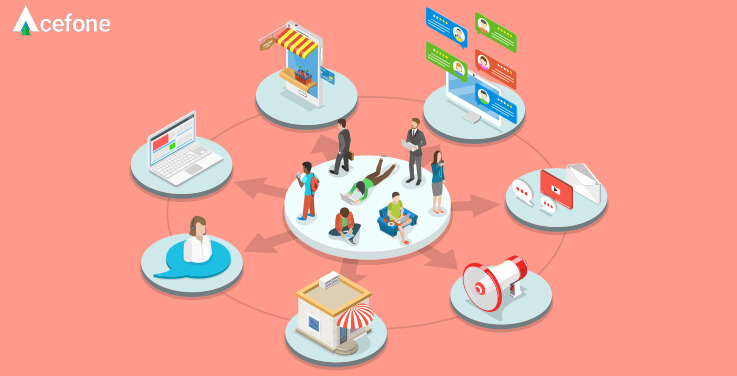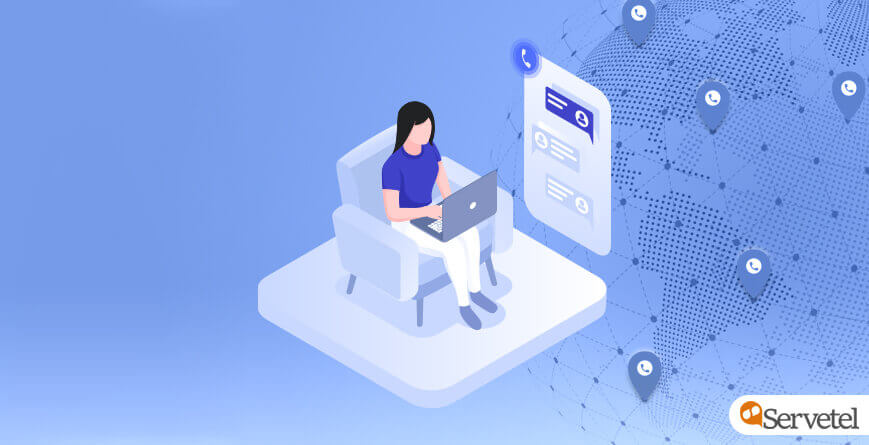The man vs machine battle has now reached its peak.
With the advent of Artificial Intelligence (AI) and Machine Learning (ML) programmes, efficiency, both in terms of work and costs, has improved dramatically.
Businesses are now actively seeking services that allow automation of previously monotonous work. Amid this search, businesses are forgoing one of the most crucial parts of their operations—employees.
News headlines are abuzz with reports of companies letting go of large sections of their workforce in place of software. This has seemed to affect people from all walks of life, from middle management to the everyday blue-collared worker.
Contact and call centers are no different.
With cloud communications sweeping the industry, automation tools like diallers, routers, IVRs and virtual receptionists have seemingly substituted a lot of the manpower previously reserved for human agents.
But, is this the right approach? Are we heading to an utterly virtually-operated business model? And if so, is that the best thing?
Chatbots: The virtual humans
Among the many automation tools, the chatbot has succeeded in cementing itself in today’s digital age.
All internet users have, without a doubt, interacted with a chatbot. When browsing a website, a window usually pops up at the corner of the screen, greeting visitors and asking them whether they need any assistance.
Chatbots are conversational tools that are designed to simulate human-like conversations with customers.
They can be as simple as mere greeting agents, or programmed with high-tech Natural Language Processing (NLP) capabilities to not only understand and analyse texts and spoken words but also to reply to them with a human touch.
Chatbots and customer service
While chatbots offer utility in different forms, one of the most widely used purposes has been in the area of customer service. This is owing to the following benefits:
-
Improved response rates:
This is one of the primary advantages of chatbots.
In today’s hyper-active world, everyone requires quick answers. Your customers are no different. The quicker they obtain query resolution, the more satisfied they are with the service.
Chatbots are perfect for quick responses.
Matthew Darby found that sophisticated chatbots, with an engaging audience, can produce response rates as high as 80-90%. Compare this with your current response rates and you will identify the benefits of including chatbots in your business communication.
-
Cost-efficiency:
Like all automation tools, chatbots end up saving businesses significant amounts of money. According to IBM, smart, AI-enabled chatbots can save companies over 30% on costs incurred while providing customer support.
With the human workforce, organisations are limited in terms of their capabilities and scope. Agents can only serve up to a specific number of customers per day and be present with one customer at a time. Also, for businesses looking to enhance engagement can leverage an ai video generator to create dynamic, automated responses that visually explain solutions, further enriching the customer service experience.
On the other hand, chatbots can serve multiple customers at once.
-
Ease of use and 24×7 availability:
Bots do not need to work on a 9-5 schedule. They can deliver their services 24×7. This feature allows companies to offer customer support services round the clock.
Additionally, chatbots are easy to use.
With instant messaging applications booming in popularity, consumers have become comfortable with typing and texting. Many millennials, in fact, prefer to interact with chatbots than human agents.
-
Scalability:
Chatbots are nothing more than lines of codes that can be easily transferred from one location to another. This is important for businesses that decide to open online stores in different marketplaces.
Not only this, with slight alterations to the code, chatbots can learn different languages.
This capability allows businesses to enter local markets and communicate with users in a language they prefer. AI chatbots can automatically understand the language inputted and develop a response accordingly.
-
Consistent and free training:
One of the most time-consuming tasks a call center undertakes is the training and re-training of its employees. Not only does this incur additional costs, but consistently keeping agents up to speed with new advancements is time intensive too.
With chatbots, machine learning algorithms ensure that the software learns and grows with every interaction.
This means that the more customers your chatbot serves, the better it becomes at engaging with others. Coupled with AI, it can use stored data to make better conversations and provide personalised services to customers.
The human impact
On the face of it, chatbots seem like the logical extension for managing customer interactions. However, many businesses seem to forget that machines, especially ones designed for communication purposes, are great at doing routine and simple conversations.
Give them a complex set of instructions that they are not programmed with, and they seem to falter.
This is why humans are best at handling complex conversations, a fact businesses must not forget.
A PwC research across 12 countries found that two-thirds of consumers feel that “companies have lost the human element of customer experience”. The study further discovers that despite the acceptance of digitisation in businesses, consumers demand more interactions with humans.
So, despite the apparent benefits chatbots and other automation tools offer to customers, do they wish for a more human touch. The following benefits of human agents explain why:
-
Realism and empathy
Modern buyers are dubbed as ‘smart consumers’. This is not just owing to the fact that they are tech-savvy and use smartphones.
With the clutter of alternatives available for every product or service, today’s consumers do their own research and enter the market with certain expectations.
One of these expectations is understanding.
Consumers demand businesses to fulfil their needs and be empathetic to them. While chatbots can peer into historical data to provide exactly what the consumer wants, humans can assess the situation through tone and voice and deliver the required service.
For example, if a customer calls in a panic about a complete loss of data, the chatbot may ask a series of important questions to analyse the problem.
However, a human can offer emotional support and assurance that puts the user at ease.
-
Solve critical issues
The biggest disadvantage of chatbots is one of the advantages of human agents.
While chatbots can give speedy answers to simple and frequently asked queries, serious problems are not the same. When a chatbot cannot comprehend a set of instructions, it passes the conversation to a human agent.
This is because chatbots may not be able to identify the problem through keyword detection alone. This results in irrelevant or repetitive answers that offer no help and only seem to aggravate the customer.
-
Customers want human agents
There are no two ways about it. Study after study delineates that customers prefer a human over a bot.
As part of their Global Customer Service Report, CGS found that 50% of respondents in the UK prefer human agents to chatbots.
This is not just a matter of the type of query. Many customers approach companies with a very specific query in mind. When they interact with a chatbot, as many as 47% feel their answers are less detailed than they hoped.
Additionally, 41% think that chatbots simply rephrase the text stated in the FAQ section. This, along with the robotic and impersonal connections built by chatbots, is why many would prefer to interact with a human agent, even if the choice compromises speed.
Bots are in but humans won’t be out
By now, brands are beginning to realise that chatbots and humans are not interchangeable. Instead, they are strategic partners in delivering customer service.
While chatbots can help ease the monotonous workload of customer support agents, a leading cause of attrition rates in call centers, humans can swoop in when chatbots are faced with complex or technical queries.
All in all, businesses must use a blended approach of both when managing customer interactions.
If you want to get the most out of chatbots for customer service, get in touch with our experts at 1888-859-0450 or drop an email at [email protected].














